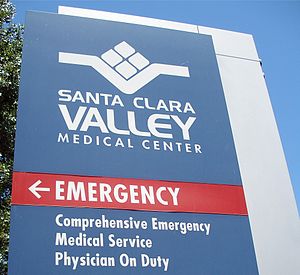
English: A roadside sign at Santa Clara Valley Medical Center in San Jose. This sign is an example of how the U.S. state of California requires all hospitals with emergency rooms to include text like “Comprehensive Emergency Medical Service” and “Physician On Duty.” (Photo credit: Wikipedia)
There’s been a lot of talk in and out of gun circles about the attempt by Florida to criminalize physicians who ask patients whether or not they own guns. The law, passed in 2011, was overturned in Federal Court but now is headed for another hearing in the 11th Circuit. At issue is whether physicians can inquire about the ownership of guns, even if no clear threat to health is perceived. Supporters of the law insist that because most physicians are anti-gun, what they are really trying to do is disarm law-abiding Americans. To quote the NRA-sycophant Dr. Timothy Wheeler: “doctors are following a hidden agenda laid out for them years ago by the American Academy of Pediatrics — an agenda that would take guns away from Floridians.”
But the question is not whether physicians are following some hidden agenda. The real question is whether they are following federal law. And the law I am referring to is the law that covers all hospitals and physicians delivering medical services covered by Medicaid and Medicare, which in the case of hospitals basically covers every hospital treatment facility in the United States. This law is regulated by an agency known as the CMS, whose treatment manuals define medical care. And here is what the CMS has to say about what a physician must do when a patient walks into an Emergency Department and requests care: “In such a case, the hospital has incurred an obligation to provide an appropriate medical screening examination (MSE) for the individual and stabilizing treatment or an appropriate transfer. The purpose of the MSE is to determine whether or not an emergency medical condition exits.”
Notice that I say “walked” into the emergency room. Obviously if someone is wheeled into the emergency room bleeding from a gunshot wound, the attending physicians don’t have to figure out whether an emergency medical condition exists. But most people who visit emergency departments don’t present such obvious symptoms of distress. Rather, they show up because they “don’t feel good,” or have a pain here or a pain there. Many are suffering from mental distress, others have been victims of domestic violence that, if left untreated, might get much worse.
How many of these patients are caught in a vortex of physical or mental deterioration that could wind up in a gun being shot off? According to Megan Ranney, an emergency room physician in Providence, patients who are treated for gun wounds have a one-in-five chance of returning with another gunshot wound within five years. Wouldn’t there be a good possibility that many of these patients would re-appear in an emergency room in the intervening period and shouldn’t an attending physician need to know whether that individual had access to a gun?
Let me quote a little further from the CMS: “Individuals coming to the emergency department must be provided an MSE appropriate to the individuals’ presenting signs and symptoms, as well as the capability and capacity of the hospital. Depending on the individual’s presenting signs and symptoms, an appropriate MSE can involve a wide spectrum of actions….” So what should a doctor do when a patient says that he or she feels “depressed” or “upset,” or reports some other sign of mental distress. Should the attending physician ignore all the data that indicates a clear correlation between household gun ownership and successful suicide attempts?
It’s time to set aside all the nonsense about how physicians have some kind of secret agenda to take away the guns. Let’s remember that it was the CDC’s announcement in a 1981 morbidity report regarding deaths from an “unknown” lung infection that eventually led to treatments for AIDS. If the NRA wants to pretend that 31,000 annual deaths and 75,000 injuries don’t constitute a health issue that’s fine. But I’ll close this post with a quote from the novelist Walter Mosely: “If you carry a gun, it’s bound to go off sooner or later.” Physicians need to figure out if the gun is going to go off, and when it does, what to do about it. That’s not a secret agenda, that’s the law.
Related articles
- The NRA Pays Doctors to Lie & Invent Research About the “Safety” of Guns. (guncontrolnowusa.wordpress.com)
- York doctors push for gun violence to be treated as public health issue (fox43.com)
Leave a Reply